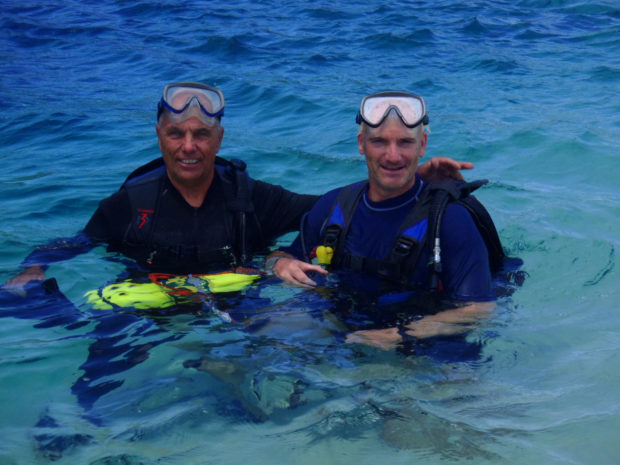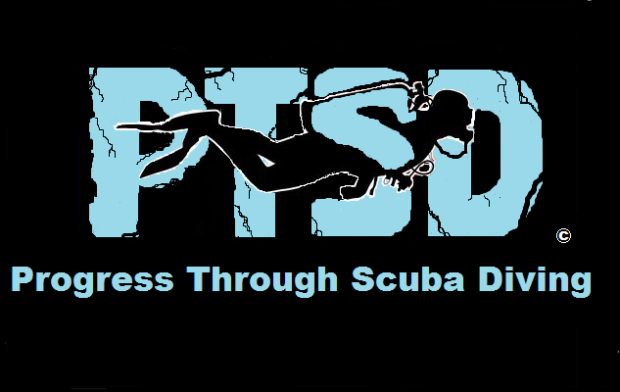Diving therapy for PTSD sufferers

My name is Kevin James, the diver not the comedian, I’m a British Army Veteran having served as a Military Policeman and then a Physical Training Instructor specializing in scuba diving. Leaving the service as a Warrant Officer. I am based on Long Island in the Bahamas. I use diving to help people suffering from Post-Traumatic Stress Disorder.
It all began in 2011 when I read a magazine piece about diving improving feelings in paralyzed individuals by up to 15%. Hidden deep within the study from the Johns Hopkins University Hospital in Maryland, I noticed the doctors suggested that they had discovered accidental improvements in PTSD symptoms of between 85% and 100%. I immediately focused on the fact that above 85% was worthy of further investigation.
As a Veteran and Scuba Diving Instructor I was very excited about the possibility of improving or even eliminating PTSD sufferers symptoms.
In an effort to give back, I began to offer my time as well as my dive equipment, boat, and expertise, free of charge to as many wounded warrior organizations that I could find on the internet on both sides of the Atlantic.
After making efforts to create interest, and being encouraged by my fellow ex-Army goalie Dave Smith, I finally decided to give up on all of the so-called ‘caring organizations’ and go it alone. In my extreme frustration I posted a rant on a British Warriors Facebook page with over 13,000 followers. This proved to be the breakthrough I needed. Jim, a PTSD sufferer who is ex Black Watch (infantry), contacted me having seen the post. He asked if he could come to the Bahamas and see whether scuba diving would help with his symptoms. I later discovered that his wife Magi was very skeptical, but a vacation in the Bahamas sounded good to her!
His symptoms were such that he flailed around in bed at night, as if he was in an electric chair. He had dark thoughts during the day about hurting people. He would get extremely angry if he so much as spilt a drink, broke something or had a minor mishap. While awaiting his arrival I contacted as many experienced dive friends and medical types that I could, picking their brains for any useful information I could use on my “Operation Black Watch!”
It was suggested to me that diving deeper was not necessarily better for improving symptoms, I kept an open mind in that regard. A programme was planned, starting with a shakedown dive to check for buoyancy, then progressing deeper for each dive to find a ‘sweet spot’ for Jim. We embarked on dives between 60 and 130 feet (18 to 40m), discovering he felt much better after the deeper excursions, then after the shallower ones. He commented that a couple of hours after one of the deep dives, he had an episode where he felt a black cloud physically leaving his brain. He discovered that he no longer felt any anger or dark thoughts. Magi confirmed he was sleeping like a baby – but stealing all the covers! The diving continued for the whole week, and both confirmed on leaving that his symptoms were no longer present. He has now been symptom free for 18 months.
Being encouraged by Jim’s success I sought, and subsequently found another PTSD sufferer. He was unable to pay his own way so I reached out to all of my friends, family and contacts asking for advice, guidance, and help with raising funds. A great friend offered Air Miles to bring him out on economy class, then returning him home first class! This was a very generous gift indeed. Encouraged by this substantial donation, I funded the internal flight, accommodation, and all incidental expenses myself. Hopefully this would enable a second PTSD candidate to contribute to our emerging track record.
Trevor was selected due to already being a diver, as was Jim. He was quite ill and had not worked for over a year. He is ex Royal Anglian Regiment (also Infantry), transferring to the Medical Corps. Both he and Jim had completed numerous combat tours. His diving programme was planned to be very similar to Jim’s previous one. And like Jim, Trevor also commented that he felt much better after the deeper dives than the shallower ones. On three separate occasions, whilst Skyping with his family, they asked if he had been drinking due to his exuberant behaviour and happy smiling face! He of course had not – he just felt so much happier. He also claimed to leave PTSD symptom free, and has been now for 11 months. Trevor is also back at work!
The next hurdle in my mind was to find a very ill individual and also someone who had never dived before, potentially opening up opportunities to a wider spectrum of sufferers in the future. I started talking to a serving Sergeant in the Royal Corps of Signals who had recently been placed voluntarily in a psychiatric facility – “smooth room, no shoelaces” was his description of his stay there. He is a keen swimmer but had never tried scuba diving.
Money was raised via a ‘Just Giving’ page for his flights and accommodations. He was instructed to complete a try-dive in the UK to ensure he was able to cope with diving. He also obtained a dive medical, and permission to dive from both his Doctor and Psychiatrist. David then went one better and enrolled for a PADI Open Water course in the UK, less the ocean dives which I was required by referral to complete for him after his arrival.
This qualification then enabled him to complete an Advanced Open Water course so he could dive deeper than 100 feet. On first meeting David it was clear that he was quite ill. Yet again, David felt very much better after the deeper dives than the shallower ones. He said it felt like his brain was being flushed from the inside out, and the foggy feeling he had before was no longer there. He also claimed to leave the Bahama’s symptom free, and it has now been 6 months.
It would appear from discoveries on the ground (and of course underwater), the following could be happening in the brain before, during and after the therapeutic scuba dives: When a traumatic event is witnessed Cortisol is produced in the brain as a coping mechanism, otherwise the person witnessing the event would have an immediate catastrophic meltdown. This substance is a sticky, gummy affair coating the ‘feel good’ receptors in the brain. This situation tends to make the PTSD sufferer very angry, as one of the symptoms. The sufferers all said this made them feel very negative, all of the time, and they simply couldn’t seem to fully enjoy life.
I am reliably informed that Serotonin (the body feel good chemical) and Nitrogen breathed at elevated partial pressures, could be forming a caustic cocktail and therefore scrubbing the sensors clean, or simply removing the Cortisol from the brain. It would appear this then allows the feel good receptors and the Serotonin to do what they are supposed to do. So far three PTSD sufferers have visited, dived, and left, all claiming to be symptom free!
Looking forward, we plan to become a registered charity. Following this achievement it is hoped that someone will look at this project with a view to enrolling sufferers with civilian or military dive centres on PTSD diver courses. They only have to be taken safely to 60 feet (18 metres) in order to gain symptom relief. David said after a shallow dive to this depth, he could feel his brain fog clearing.
Talking is also a very big part of helping sufferers before and after dives, but that will always be present where veterans and serving soldiers are concerned.
Should anyone have any questions or want to help us at the charity, contact me via our Facebook page PTSD Progress Through Scuba Diving.








